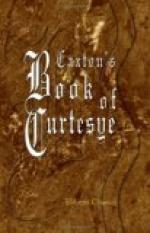CAXTON’S TEXT.
[15]
And whan ye speke / loke men in the face
[Sidenote: When you speak to men, look ’em
in the face.]
With sobre chere / and_e_ goodly semblaunce
Caste not your eye a syde / in other place
101
For that is a token of wantou[=n] inconsta_n_ce
Whiche wil appeyre your name & disaua[=n]ce
The wise ma_n_ saith who hath these thi_n_gis thre
[Sidenote: The wise Man says]
Is not lyke a good_e_ man for to be
105
[16]
[Sidenote: Leaf 3 b.]
In herte he seith / who that is inconsta[=n]te
A waueryng eye / glydyng sodeynly
[Sidenote: an inconstant man with a wavering
eye and a wandering foot]
Fro place to place / & a foot varia[=n]te
108
That in no place / abydeth stably
These ben [th]^e signes / the wisema_n_ seith sikerly
Of suche a wight / as is vnmanerly nyce
And is ful likely disposid vnto vyce
112
[Sidenote: will turn to vice.]
[17]
Awayte my chylde / whan ye sta_n_de atte table
[Sidenote: When you serve at table,]
Of maister or souerayn / whether it be
Applye you for to be seruysable
115
[Sidenote: be attentive and tidy,]
That no defaute in you founden be
Loke / who doth best / and hym ensiewe ye
And in especyal / vse ye attendaunce
[Sidenote: specially to well-off men.]
Wherein ye shal your self best auaunce
119
* * * * *
THE ORIEL TEXT.
[18]
A[s] ye be comaundyd, so ye do algate,
Beth not wyth-oute cause from the tabul
absent;
Hit is plesaunce vnto the gret astate
122
To se theyr_e_ saruaunt about them p_re_sent;
Haunteth no halkes, for then ye woll be
schent.
Lette maner and Mesure be
your_e_ guydes twey,
So shall ye best please, I
dare well sey. 126
[19]
Rewarde all-way the loke and countenaunce
Of your_e_ master, or of your_e_ souereine,
Ther shall ye best preue what is plesaunce,
129
And what displesaunce; this is the soth
serteyne,
The chere discureth often tyme both twayne,
And eke the chere may some
tyme you addresse
In thyng that langage may
not [th]an expresse. 133
[20]
And what ye here there, loke ye kepe hit secre,
Besy report of mystrust is cheff norice;
Mekell langage may not all fautles be;
136
Than doth, my childe, as teicheth you
the wyse,
Whiche vnto you this wysdome dothe devise,
’Here and see, be still
in euery prees,[1]
[Sidenote 1: MS. ‘in euery place and in
prees.’ Place was to have
been the last word; and in prees was carelessly
added, instead of
striking out place.—Sk.]
Passe forth your_e_ way in
silence and in pees.’




